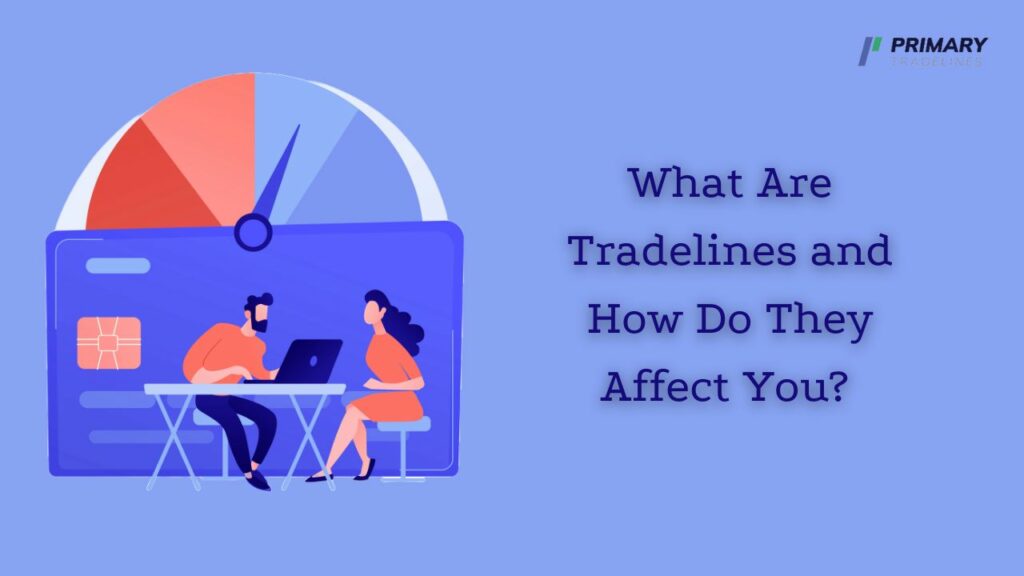In today’s world, your credit score is like your financial report card, affecting everything from getting loans to landing the best interest rates, and even influencing job offers. But did you know there’s a key factor behind every credit score? It’s called a Tradeline. Tradelines are the foundation of your credit report, playing a major role in shaping your overall credit history and score.
Tradelines play a significant role in shaping your credit history and score, affecting everything from loan approvals to interest rates.

What Are Tradelines?
Tradelines refer to the individual credit accounts that appear on your credit report.
Anytime you open a new credit account—whether it’s a credit card, mortgage, auto loan, or personal loan—a tradeline is created. This tradeline is reported to the credit bureaus (Equifax, Experian, and TransUnion), where it forms part of the data used to calculate your credit score.
- Account Opening: A tradeline is created when you open a new credit account.
- Lender Reporting: Creditors report account details to credit bureaus, usually monthly.
- Permanent Record: Tradelines remain on your credit history as long as the account is active or closed in good standing.
Types of Tradelines
Not all tradelines are created equally. In fact, they can be classified into different types based on how the credit works.
- Revolving Credit
Revolving tradelines include credit cards and lines of credit. In these accounts, you can borrow repeatedly up to a limit, and the balance can fluctuate. The account remains open indefinitely as long as payments are made.
- Installment Credit
Installment tradelines, such as mortgages, student loans, and auto loans, involve borrowing a set amount and repaying it through fixed monthly payments over a specified term.
- Open Accounts
Open accounts are more commonly associated with businesses. They are typically settled in full after a transaction, such as utility bills, where the amount due can vary each month.
Tradelines on credit reports include accounts where you’re the primary borrower, cosigner, or authorized user. The impact varies: missed mortgage or auto loan payments hurt your score more than missed credit card payments. Credit card tradelines include limits and utilization; auto loans do not.
How Tradelines Affect Your Credit Score
FICO and VantageScore are two major credit scoring models used by lenders, landlords, utility companies, and employers to assess an individual’s credit history.
FICO:
Created by Fair Isaac Corporation in 1989, FICO scores range from 300 to 850 and assess five factors, including payment history and credit mix. Different versions are tailored for each credit bureau.
VantageScore:
Introduced in 2006 by Equifax, Experian, and TransUnion, VantageScore also ranges from 300 to 850 and focuses on credit account history and consumer management over time.
Key Differences
- Calculation Methods: FICO and VantageScore have different approaches to score calculation, with unique weighting for categories and information.
- Credit History: FICO requires at least one credit account to be open for six months, whereas VantageScore needs just one open account.
- Trended Data: VantageScore 4.0 includes trended utilization data, indicating whether consumers typically make only minimum payments or pay their balances in full. FICO does not incorporate this feature in its calculations.
Let’s break down how tradelines influence key factors in credit scoring:
- Payment History (35%): Timely payments boost scores; missed payments harm them.
- Credit Utilization (30%): Low utilization (using less of your credit limit) helps scores.
- Length of Credit History (15%): Longer accounts improve scores.
- Credit Mix (10%): A diverse range of credit types can enhance scores.
- New Credit (10%): Opening too many accounts at once can negatively affect scores.
Positive tradelines, where you consistently make on-time payments and keep balances low, will naturally boost your credit score. Negative tradelines—like missed payments or maxed-out credit cards—can have the opposite effect.
Managing Tradelines for Better Credit
Managing tradelines wisely is essential for building and maintaining a strong credit score. Here are a few strategies to ensure your tradelines work in your favor:
- On-Time Payments
The most straightforward and impactful action you can take is paying your bills on time, every time. Set up auto-payments or reminders to avoid missing due dates.
- Keep Credit Utilization Low
Keep your balances low compared to your credit limits. If possible, aim for 10% or less of credit utilization to maximize your score’s potential.
- Monitor Credit Reports
Regularly check your credit report for errors or fraudulent activity. If you notice inaccurate information, dispute it with the credit bureaus immediately.
- Removing Negative Tradelines
If you have negative tradelines, such as collections or charge-offs, there are ways to minimize their impact. Dispute any errors, negotiate with creditors for settlements, or pay off collections to improve your standing over time.
The Role of Authorized User Tradelines
What Are Authorized User Tradelines?
These occur when someone is added to another person’s credit card account, benefiting from the primary holder’s credit history.
Benefits:
- Credit Boost: Improves your credit score through a positive payment history.
- Access to Credit: Provides credit access without applying for your own card.
Risks:
- Potential Damage: Negative actions by the primary user can harm your score.
- Lack of Control: You can’t manage the account directly.
Authorized user tradelines can boost your credit score if the primary cardholder makes on-time payments and keeps balances low. However, missed payments or high usage can hurt your score.
Conclusion
Tradelines are the building blocks of your credit report, shaping your financial profile through your payment habits, credit utilization, and account management. Understanding how tradelines work, the types you hold, and how to manage them effectively is critical for maintaining a healthy credit score.
Tradelines are vital for your credit score, as they reflect your credit accounts and payment history. To manage tradelines effectively, make on-time payments, keep credit utilization low, and regularly monitor your credit reports for accuracy.
Leave a Reply